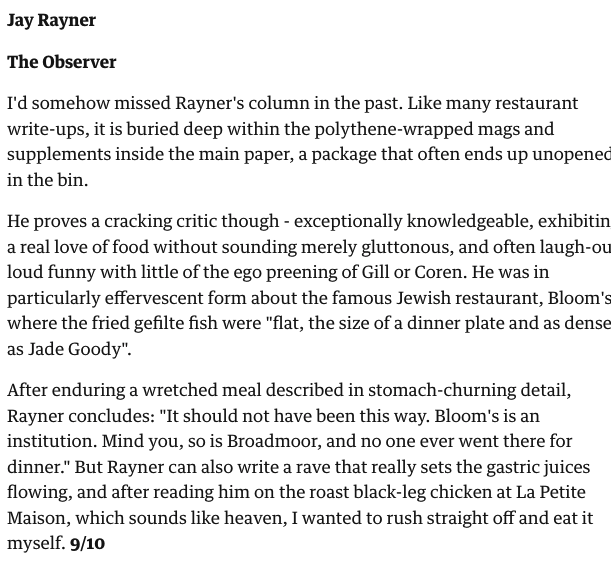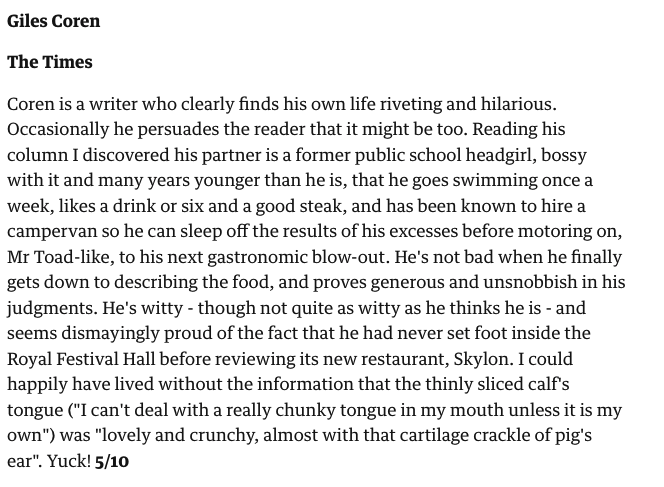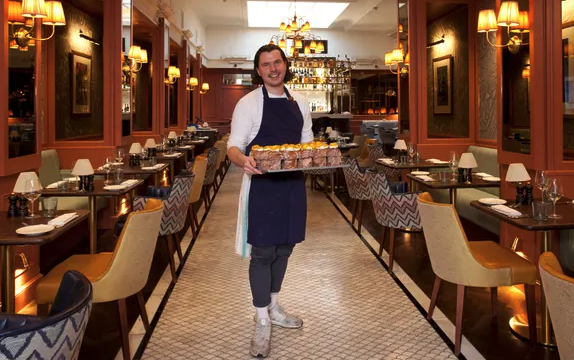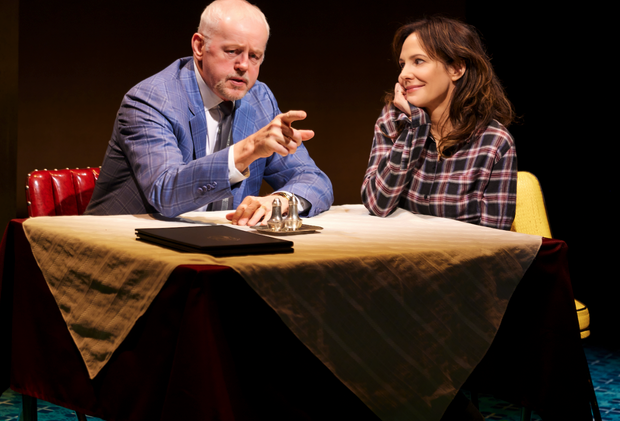Welcome to today’s edition of ShentonSTAGE.
More differences of opinion — and not just in the theatre
Last Friday I wrote here about differences of critical opinion, and outlier reviews which contradict the general sway of reactions, like the Chicago Tribune’s Chris Jones did on the play BIRTHDAY CANDLES last week.
It’s a recurring theme, of course, that critics diverge in their tastes and opinions; this is often used as evidence against them that they’re therefore officially pointless. But if there’s no such thing as right and wrong in reviews, you need the negative reviews just as much as the positive ones to provide the balance from which to make up your own mind to who to trust and believe.
A world of constant gush and hyperbole on social media — in which every show is greeted as the best thing ever (at least since the last best thing ever) — may feed a current rush for narcissistic attention (by both the provider and the receiver of it), but doesn’t ultimately serve anyone.
Last night Frank Wildhorn’s Broadway musical flop version of BONNIE AND CLYDE opened at the Arts Theatre in a new production and one highly excitable blogger predictably, who’d already been to the first preview and was back for more, tweeted afterwards: “If Jordan Luke Gage was incredible in this role at the first preview, his ‘Raise a little hell’ tonight is the single best performance I’ve ever seen.”
For this to mean anything at all, you’d have to know just how many other incredible performances he’s ever witnessed, but of course it’s a judgement made in the ecstatic moment, as is his exclamation in his tweet previewing his review: “We have a strong contender for the best show of 2022 in BONNIE AND CLYDE.” We’re only in April, so of course he can’t make that judgement yet, and we’re bound to have other contenders which he can’t shut himself out of getting equally excited about.
So this gush is just a sugar rush, not meaningful criticism. It’s easy to dismiss such pointless commentary just on face value, since there’s so obviously nothing in the way of critical judgement actually supporting it. But how do you separate the wood from the trees, the guff from the sensible, when you’re reading other commentators?
It helps, of course, to know a bit about the critic or commentator you are reading. Given that theatre critics are, for the most part, shy and retiring types, they may take time to reveal themselves; but over time, you will start to know something of their tastes and enthusiasms.
Contrast this with restaurant reviewing. The late AA Gill always inserted his own large personality into every review he wrote — and interestingly, at one point wrote a column dismissing theatre reviewing for precisely this failure, claiming that this was proof of the vibrancy of the pleasures of food as a kind of participatory theatre; it was, of course, more proof of his otal delight in himself. In reply, Charlie Spencer, then theatre critic of the Daily Telegraph, wrote a wonderful appraisal of restaurant critics for the British Journalism Review that was extracted in The Guardian here.
Two of the critics that Charlie wrote about then are still writing today: Giles Coren in The Times and Jay Rayner in The Observer.


And last week, they both reviewed the same restaurant: The revamped Richoux in Piccadilly. Rayner dubbed it “an instant classic”, in a review that delightfully embraced the establishment’s storied history and current delights, as well as his guest’s tardiness (that meant they had to skip dessert, but he diligently returned to sample it a couple of days later). Coren’s “review” was more about his own family’s long history with fish and chip shops, with a few final desultory paragraphs about the establishment itself that were pretty harsh.

Restaurant criticism of this kind is a blatant kind of narcissism, and for The Times, that has sadly become par for the course, especially amongst the writers in its Sunday edition. Quentin Letts, theatre critic of Sunday’s Culture supplement, has turned his weekly theatre digest into a platform that now trolls his own readers, as I wrote here on Monday.
In his review of THE 47th, Mike Bartlett’s new play that puts Donald Trump centrestage, he says: “Bartlett does not merely and lazily attack Trump. He acknowledges something of his electoral genius. Trumpism appeals to people ‘sick of paying taxes to a stifling culture they do not believe’. In jabbing the liberal, metropolitan Old Vic crowd, this show does something to make that culture less stifling.”
Of course, this is reviewing as a kind of entertainment, rather than a guide as to whether to actually see the play concerned; most of his readers are unlikely to ever see what he’s writing about. There’s a great line in Arthur Miller’s ALL MY SONS in which a character remarks how he always reads the book reviews (but not the books themselves) in the paper, “to keep abreast of my ignorance.” Just as it is much quicker to read the reviews than the books, it is easier (and cheaper) to eat out at swanky restaurants by simply letting Coren and Rayner do it for me. But I won’t let Letts be my guide to seeing theatre vicariously; he may give a taste of his distaste, for the most part, of the theatre, but I know not to trust it, any more than the hyper-enthusiastic blogger.
Actors returning to scenes of former glory
Carol Channing, of course, was forever associated with the role of Dolly Levi, having originated it in the original production of HELLO, DOLLY! in 1964; she’d return to play it on Broadway in 1974 and 1995; Yul Brynner similarly made a career of playing the King in THE KING AND I, creating the role in the original 1951 production, then reprising it in 1977 and 1985. Both performers also would go on to bring those revivals to London (to Drury Lane and the Palladium respectively, both in the 1980s).
It’s rarer for the original stars of plays to return to their roles many years later. But last night, Mary-Louise Parker and David Morse finally brought the roles they originated in the 1997 Off-Broadway premiere of Paula Vogel’s HOW I LEARNED TO DRIVE to Broadway, where it opened in a revival at Manhattan Theatre Club’s Friedman Theatre.

As Adam Feldman notes in a review for Time Out New York, “Most good theater lives on, if it’s lucky, only in the memory of those who saw it. Manhattan Theatre Club’s revival of Paula Vogel’s How I Learned to Drive, one of the signal plays of the 1990s, represents an exception. With a firm eye on the rearview mirror, this production reunites director Mark Brokaw, who helmed the show’s premiere at the Vineyard in 1997, with its two exceptional original stars, Mary-Louise Parker and David Morse; also along for the ride is Johanna Day as the principal soloist in the show’s Greek Chorus of three, plus lighting designer Mark McCullough and sound designer David Van Tieghem. After more than a quarter of a century, they all move assuredly in old roles as the play shifts back into gear.”

And for Theatrely, Juan A Ramirez writes, “There are many reasons why people are skeptical of revivals, especially ones that trot out an original cast member for box office nostalgia’s sake. But How I Learned to Drive, finally on America’s most visible stage, is neither showy nor superfluous. Mary-Louise Parker has, quite frankly, never been better, and her chemistry with Morse is enough reason to commit the production to celluloid history. Seldom does a return engagement do complete justice to its source material, but this is the rare production that proves itself absolutely vital with each passing minute of its captivating time.”
In the New York Times, Maya Phillips describes a moment of sheer theatrical rapture: “On the night I saw the production, hundreds of audience members listened with rapt attention — I didn’t hear anyone unwrap a mint or fumble for a tissue. I didn’t even hear a whisper break the stillness in the air. There was just the steady buzz of the lights, suddenly deafeningly loud, as if they were performing their own monologue. If I could direct a scene representing why I love theater, it would look something like this: Mary-Louise Parker and David Morse delivering crushing performances — both sentimental and horrific, utterly complex — of a Pulitzer Prize-winning play to an enthralled audience.”
SEE YOU ON FRIDAY
If you can’t wait that long, I may also be found on Twitter here: https://twitter.com/ShentonStage/.
